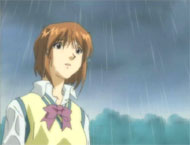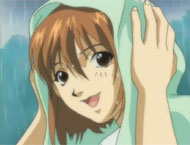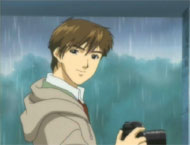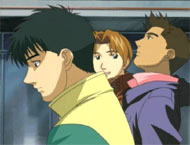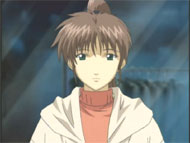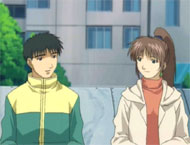

Quick Links:
Boys Be... Original Soundtrack
Boys Be... is a show that presents time as one of life's splendid contradictions - its significance in our lives being trumped perhaps only by its insignificance. Time stops for nothing in the dark hours, but promises endless renewal and wonder. It's hard to imagine how the musicians of Be-Factory reacted when shown that their job was to capture life itself - but then, life is perhaps the one thing we all can relate to. It helps that the series is set in the high school years, a time in which a person feels every feeling imaginable, without understanding any of it. The music is kind of like that.
This album - like the series - is arranged around the seasons of the year: Haru (spring), Shoka (early summer), Natsu (summer), Aki (autumn), and Fuyu (winter), with a few transitions sprinkled in. Spring carries a feel of both discovery and wild fantasy. The Haru section of the album starts with a peppy and youthful song, hitting hard with glorious 80s synth in the middle, and finishing with a seductive little violin number. A touch of relaxation and calm sincerity ease the listener into the wild days of summer. The Shoka section is a transition from spring to summer - starting with a relaxing island song, and finishing with a lovely transitional piano piece.
Summer is time for the arcade, sports, and watching cute girls on the beach! I guess those of you who aren't into cute girls would do that "shopping" thing, whatever that's for. These songs really take you there, which can be a most unfortunate thing if you're sitting in the office counting down the minutes until you're free to dream again. Natsu I takes you sunbathing - the guitar and bass filling the senses and making you want to just sit and take it all in. Natsu II brings you to the arcade with its peppy flute. Natsu III is an odd carnival tune, Natsu IV is a 50s style song that adds in synth instruments for added zaniness, and Natsu V is a remake of Haru III using acoustic guitar, for that "Hot Summer Nights" feel. The emphasis in the Natsu section is on fun.
At this point I should mention that the appearances of each song in the album don't really reflect the order they appear in the show, and yet their order brilliantly reflects the progression of feelings in the show, from first beginnings to bitter ends and back again. As the album rolls into autumn, the music becomes more sentimental and regretful - rich in both feeling and heartache. Aki I - a pretty piano piece - is without a doubt the most bittersweet of the songs in this album, and my personal favorite. Its gentle progression in the beginning reminds one of what it's like to fall in love, and then the bridge tears at you with that all-too-familiar feeling of separation. The song finishes by adding a refined touch to its youthful beginnings, almost as if to show the rewards of perserverance. The next song in the Aki section smells of trouble in paradise, with a somber oboe and a heavy string section. Aki III rolls the album into early winter with a cold and lonely piano piece, while Aki IV bundles up with another warm acoustic guitar piece.
The Fuyu tunes carry the common theme of self-reflection. For most, it's a renewal of one's appreciation for the gifts in life. For others, it's the quiet struggle for emotional survival, until spring again breathes life into the heart. Fuyu I is a quiet snowfall tune, with sleigh bell accents and a synth foreground. Fuyu II is another pretty and sentimental piano/oboe piece, with a touch of sadness. Fuyu III seems to speak, "Tommorrow's another day" with its lighthearted synth backed by acoustic guitar and piano. And Fuyu IV is a dual acoustic guitar and piano piece backed with strings, focusing on the fondness of memories past. The seasonal songs are the real meat of the album, and capture the same feelings as the series - for those who seek to relive it.
Scattered throughout key points in the album are a number of vocal songs, most with a driving rock beat. My Tommorrow, Truth, Where is My Paradise?, Memoria, and Hatsukoi serve as effective interludes between the seasonal pieces, in addition to providing considerable entertainment value to the album as a whole. Certainly, these vocal pieces make the album accessible to more than just fans of the series, and the image song Naisho no Kimochi (secret feelings) by Aki Maeda is icing on the cake.
Maeda has three songs on the album, but unfortunately the opening and closing songs of the show (Daijoubu and Minna ga Ii ne) are presented in their TV-length formats. Naisho no Kimochi carries a similar feel to the other two - a sort of happy-go-lucky, "everything will be fine" sentiment - but in the end it seems to amount to nothing more than a gesture for appeasement, to take our minds off of the two songs that everyone would have wanted full versions of. Nevertheless, it's a welcome addition to an already great album.
The final song I wish to talk about is one titled Sakura. It does not really carry a seasonal theme, nor is it an interlude; but instead, it serves the show well as the introductory theme to each episode. It's a repetitive piano piece that fits the show's circular storytelling, but also serves as fitting background music during any kind of iterative thought pattern (I'm a programmer - we eat this stuff up).
Though it's hardly accurate to say that Be-Factory has covered all bases in their aural recreation of life, it's fitting to say that they've created an impressive array of emotional stimulants that are sure to brighten up one's day as well as stir up dormant feelings and thoughts. Much like the series, I cannot recommend this album enough.

